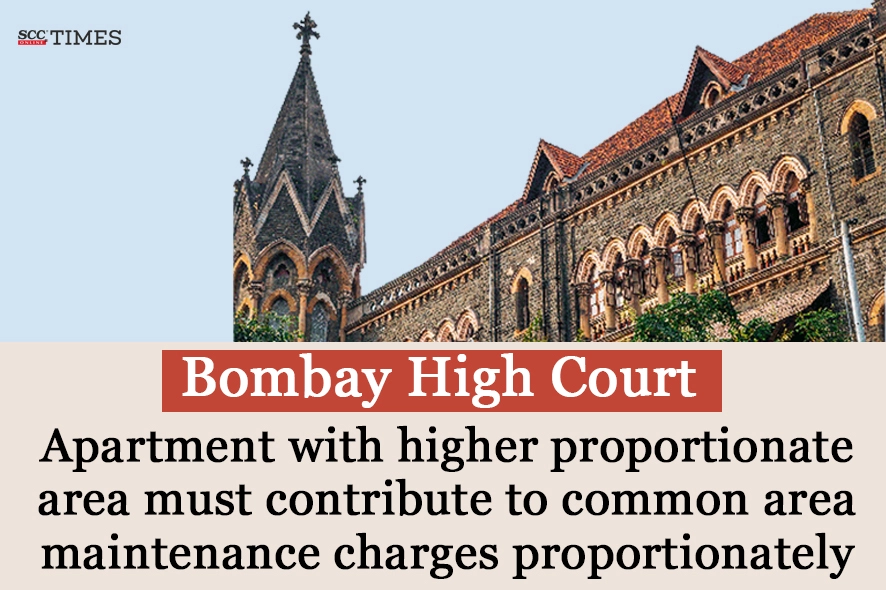Bombay High Court: In a dispute regarding levying maintenance charges of the apartment in terms of Section 10 of the Maharashtra Apartment Ownership Act, 1970 (‘the Apartment Act’), the Single Judge Bench of Milind N. Jadhav, J., upheld the order passed by the Deputy Registrar, Cooperative Society and held that the petitioners cannot obstruct the implementation of the Apartment Act. The Apartment Act stated that common profits of the properties to be distributed amongst and the common expenses, to be charged to the apartment owners according to the percentage of the undivided interest in the common area and facilities. Thus, member holding an apartment with a higher proportionate value and size must contribute to the common area maintenance charges proportionately.
Background
Treasure Park was a registered condominium comprising of 356 apartments registered under the Apartment Act. A Deed of Declaration dated 29-7-2011 was executed and registered subjecting the property to the provisions of the Apartment Act and also a Supplementary Deed of Declaration dated 31-5-2017 was executed and registered for additional construction in consonance with each other. The General Body of the condominium passed a resolution providing that the maintenance charges were to be charged equally to all apartment owners irrespective of the area of their flat or their undivided share and only the contribution towards the sinking fund would vary as per the undivided share or area of the flat.
With reference to the said resolution, certain residents approached the Deputy Registrar of Co-operative Societies alleging that the maintenance charges levied by the condominium are in violation of Section 10 of the Apartment Act. The Deputy Registrar directed the condominium to levy maintenance charges proportionate to the undivided share of the apartment owners in terms of Section 10 of the Apartment Act.
Challenging the order passed by the Deputy Registrar the petitioners approached the Co-operative Court, Pune, but their appeal got rejected. Aggrieved by the same, the petitioner approached the present Court.
Analysis, Law and Decision
The Court observed that the rights of the parties are governed by the Deed of Declaration. The Society was registered as condominium of 11 buildings comprising 356 apartments under the Apartment Act. Apartments were of 3BHK, 4BHK and 2BHK areas, and some with garden. There was a Supplementary Deed of Declaration which applied in respect of the additional construction. The individual apartment holders had entered into and executed the agreements and therefore, they were bound by the clauses contained in the Apartment Act along with the Deed of Declaration.
The Court noted that the combined reading of the Section 6 and 10 of the Apartment Act and the provisions of the Deed of Declaration provides that the undivided interest in the common area and facilities is an interest which runs with the apartment and upon transfer, the undivided interest, sale and transfer together with the apartment irrespective of a specific covenant to that effect in the Conveyance Deed.
Therefore, the Court observed that the Deed of Declaration was in consonance with the provisions of the Apartment Act. The ascertainment of percentage of interest in the common area granted to each apartment owner was according to the Deed of Declaration which was required to be calculated in proportion to the value of the apartment in relation to the value of the entire property as provided in the Apartment Act.
Furthermore, it was observed that provisions of Section 10 of the Apartment Act mentioned that the common profits of the property shall be distributed among and the common expenses shall be charged to the apartment owners according to percentage of the undivided interest in the common areas and facilities squarely applies to the case of the petitioners. The Court also pointed out that the petitioners have already benefited in the past due to the inequality and non-application of the statutory provisions under the Apartment Act and merely passing a resolution which was against the provision of the Apartment Act does not bar them from following the due procedure of law.
Accordingly, the Court upheld the cogent and well-reasoned order passed by the Deputy Registrar, Co-operative Society, Pune and held that the member holding higher proportionate value and size (area) of the apartment must contribute to the common area maintenance charges proportionately.
[Sachin Malpani v. Nilam Patil, 2025 SCC OnLine Bom 2818, decided on: 4-8-2025]
Advocates who appeared in this case:
Advocate for the Petitioners- Atul Damle, Senior Advocate; Vaibhav Kulkarni, Prathamesh Deshpande, Disha Rathod and Yash Agarwal, Advocates
Advocate for the Respondents- P.J. Gavhane, AGP; Khushnumah Banerjee i./by Vidhii Partners, Advocate




A more practical way is to also combine number of family members living in one apartment.
Most recurring costs like common electricity bill of lifts, lighting, water, garbage quantity, security etc is per capita.